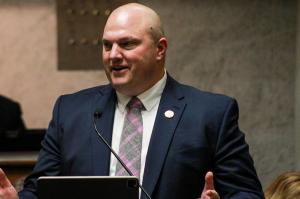
Republican Indiana Attorney General Todd Rokita, center, announces at the County-City Building that he's suing against St. Joseph County, alleging its jail is violating a new state law by not cooperating with federal immigration officials. Sheriff Bill Redman denied the allegations. (Jeff Parrott)
Republican Indiana Attorney General Todd Rokita sued St. Joseph County Friday, alleging its jail is breaking a new state law by not cooperating with federal immigration officials.
Rokita, a vocal supporter of President Trump, held a press conference in the lobby of the County-City Building, moments after he filed suit in St. Joseph Circuit Court. He says Democratic Sheriff Bill Redman has ignored requests from U.S. Immigration and Customs Enforcement to hold people who had been arrested on various charges and were living in the U.S. illegally.
Rokita said an influx of undocumented immigrants in recent years is overtaxing Indiana’s resources. As an example, he talked about a teacher who told him she had retired early because she was so tired of having to teach more students who don’t speak English.
"She had tears running down her face," he said. "She said she was retiring. I asked what was wrong. She was much too young to retire. She said, 'I'm retiring because I can't take it anymore.'
"She told me that every day she gets a list of additional names added to her classroom size. Names that she can't pronounce. And she ends up spending every class hour calling an 800 number where she then is made to pick between multiple translators. Our schools are being overrun by
Our schools are being overrun in some areas, if not every school district, by illegal immigrant illegal alien children, who are overfilling the classroom, taking up resources like they're taking away law enforcement resources, like they're taking up hospital resources," Rokita said.
Rokita in July filed a similar suit against Monroe County in Bloomington.
He said just before filing the suit Friday he had attended a citizenship ceremony at the federal courthouse in South Bend.
"I was proud to welcome them because they came here the right way and they love our country. Several of them afterwards told me so. Thanks for saying what you did Mr. Attorney General. People need to come here the right way."
Rokita says Redman is doing it the wrong way.
"This deliberate decision to not cooperate with federal authorities is giving safe harbor to criminal aliens that need to be removed from this country and this county."
Redman was out of town Friday. In a Facebook post, the sheriff department denied Rokita’s allegations, saying, “When the jail receives a detainer or request from ICE, staff promptly informs immigration officials when that individual will be released on their criminal charges for detainment by ICE.”
Rokita did not name the city of South Bend in the lawsuit but Democratic Mayor James Mueller issued a statement saying he is "proud that South Bend is a welcoming city."
Muller said "while the city of South Bend adheres to all state and federal laws, we uphold the Constitution and all individual rights granted by the Constitution, first and foremost."
Countering that, Republican county commissioners Carl Baxmeyer and Tony Hazen released a statement saying they were "seriously concerned" by Rokita's allegations. They called on Redman to "put St. Joseph County citizens first, to enforce the law, and make sure his policies, whether written or unwritten, comply with federal regulations rules. We are not a sanctuary county and St. Joseph County residents deserve the right to basic safety."
Neither Rokita, nor Baxmeyer or Hazen, cited any evidence that crime has risen in the county.
The sheriff department statement added, "We also remind the attorney general that neither state nor federal law require the sheriff or the jail to enforce federal immigration laws. The sheriff and the department fully comply with all state and federal laws, and will now unfortunately have to defend itself in court against the state of Indiana."
Rokita's suit alleges the county is in fact violating a state law that forbids restricting communication between federal and local and law enforcement.











